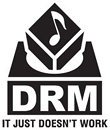Sunday, October 9th 2011
Ditch The Restrictive DRM: Happy Customers Equals More Profit
Rice University and Duke University are the latest in a long line of educational institutions to fund research on the effect of using restrictive Digital Rights Management (DRM) to try and control levels of so-called "piracy", which is allegedly reducing sales of content-only, infinite goods/virtual products, such as music, movies, computer games and books. (Some observers writing about DRM replace the word "Rights", giving us the phrase Digital Restrictions Management, which seems a more accurate description of what it's really about and removes the veneer of legitimacy from it. When buying DRM'd content, you are buying digital handcuffs, nothing more, nothing less.) The universities sponsored a study called Music Downloads and the Flip Side of Digital Rights Management Protection and what it found is that contrary to popular belief amongst the big content companies, removing DRM can actually decrease levels of piracy and increase sales. The fact is that DRM is always broken by hackers and pretty quickly too, often within a day or two (there isn't a single one still standing) leaving legal users who work within its confinements with all the restrictive hassles that it imposes, while the pirates get an unencumbered product to do with as they please. How is this progress?The study says:
The points above are something that websites such as Techdirt have been saying for years, so the message has been out there for a long time, if only the big corporations would listen.
This study is due to be published in the November-December issue of Marketing Science, produced by the Marketing Science Institute, a well-respected organization established 50 years ago in 1961. However, looking at the MSI's website, one can see that they unfortunately do operate a paywall system, itself a form of DRM. Therefore, it seems safe to say that this new research will be locked away from the general public, which is ironic indeed. On top of that a copy is likely to appear on file sharing websites like The Pirate Bay anyway, so why bother?
While this story was reported directly from Rice University's announcement, thanks go to engadget for their news story, which inspired this one.
TorrentFreak has also reported on this story, here and is a website well worth reading.
Source:
Rice University
Removal of these restrictions makes the product more convenient to use and intensifies competition with the traditional format (CDs), which has no DRM restrictions. This increased competition results in decreased prices for both downloadable and CD music and makes it more likely that consumers will move from stealing music to buying legal downloads. Unlike in earlier literature, we examine consumers' choices among all the major sources of music. By analyzing the competition among the traditional retailer, the digital retailer and pirated music, we get a better understanding of the competitive forces in the market.Then the punchline, the part that really matters in this whole debate:
Decreased piracy doesn't guarantee increased profits. In fact, our analysis demonstrates that under some conditions, one can observe lower levels of piracy and lower profits.Yes, that's right, preventing someone from making a copy in no way equates to that person actually buying a copy, which is really quite obvious to most people, except the big content companies.
The points above are something that websites such as Techdirt have been saying for years, so the message has been out there for a long time, if only the big corporations would listen.
This study is due to be published in the November-December issue of Marketing Science, produced by the Marketing Science Institute, a well-respected organization established 50 years ago in 1961. However, looking at the MSI's website, one can see that they unfortunately do operate a paywall system, itself a form of DRM. Therefore, it seems safe to say that this new research will be locked away from the general public, which is ironic indeed. On top of that a copy is likely to appear on file sharing websites like The Pirate Bay anyway, so why bother?
While this story was reported directly from Rice University's announcement, thanks go to engadget for their news story, which inspired this one.
TorrentFreak has also reported on this story, here and is a website well worth reading.


65 Comments on Ditch The Restrictive DRM: Happy Customers Equals More Profit
4) Super-consumers: Buy tons of bytes, but steal a good bit of it too. They've heard it, seen it and played it; even if they had to pry it out of George Lucas' hands. ;)
not to mention extortionate prices new games here in NZ cost between $95 and $115 bucks, add to that the always on Internet connection you must have to even play single player which will cost you $70 per month, and any fee's they charge to play on their servers and you can see where I'm going.... Just how much am I expected to keep paying to play something I already payed for
An expansion pack, in this case Diablo II: LoD retailed for probably $20 cheaper than the core game. A new campaign beyond
DLC, in this case Civilization V adds one, maybe two new civilizations to play as and probably a new map as well. They sell for $5 each, which when you add up all of it comes out to be quite a bit more money for what you would have gotten with a full expansion.